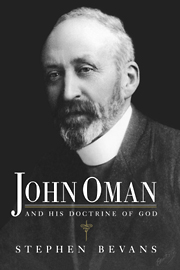5 - A God of omnipotent love
Published online by Cambridge University Press: 05 September 2009
Summary
“We have to do with God,” Oman wrote, “but with a God who has to do with man. A true theology is merely an exposition of all that this involves.” It is the gracious, personal nature of this “God who has to do with man,” that this chapter and the next seek to elaborate. As I mentioned in the beginning of this study, Oman never wrote a specific treatise on God, but when one reads his works it is clear that a very definite doctrine is there, informing every aspect of his theological thinking. What I want to do in these chapters, therefore, is to try to make explicit and systematic what is implicit and rather scattered throughout all of his writings. In the present chapter I shall focus on the doctrine of God in general, and in the following chapter I shall speak of God in specifically Christian terms.
DIVINE OMNIPOTENCE: A CRITIQUE
The best place to start, I believe, in constructing Oman's doctrine of God is with his critique and reinterpretation of the traditional doctrine of divine omnipotence. Such a rethinking of the doctrine will involve the development of a doctrine of God in which God is understood as powerful and loving in bringing men and women to true freedom, and in which God remains both powerful and loving despite the presence of sin and suffering in the world. In all his writings on God, the overcoming of a doctrine of omnipotence which conceived God as acting less than personally was Oman's chief concern, and I believe it is fair to say that he pursued this task with a passion.
- Type
- Chapter
- Information
- John Oman and his Doctrine of God , pp. 82 - 101Publisher: Cambridge University PressPrint publication year: 1992



